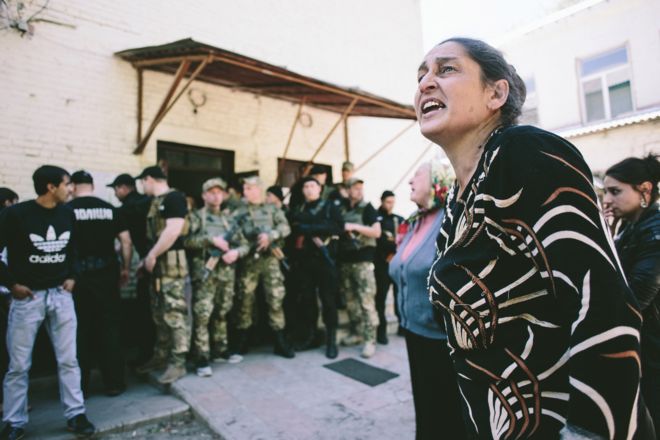Ukrainian prosecutor refuses to investigate police inaction during shocking anti-Roma pogrom

An Odesa court has reinstated the criminal proceedings initiated over police failure to react during anti-Roma riots last year in Loshchynivka, but only after human rights lawyers challenged the prosecutor’s decision to terminate the investigation.
Hromadske Radio reports that lawyers representing victims for the Ukrainian Helsinki Human Rights Union’s Centre for Strategic Litigations lodged the complaint over police inaction during the events on August 27, 2016.
As reported then, the disturbances in Loshchynivka in the Odesa oblast targeting Roma residents ended with the entire ethnic group ‘agreeing’ to leave the area.
The effective pogrom was triggered by the discovery of a 9-year-old girl’s body in an abandoned building. A 21-year-old man who was from a mixed family and not part of the Roma community was taken into custody on suspicion of murder and rape. He was from Loshchynivka and had lived there all his life, giving the lie to the claims of those participating in the pogrom that they were against Roma who had arrived in the last three years.
A crowd of around 300 locals set fire to one Roma building and devastated several others. The fact that nobody was injured is probably only because the people in the houses fled in time.
While the police were heavily outnumbered, the video footage showed them making no effort at all to intervene, just standing and watching. It was only after the local authorities promised to hold negotiations the following day, that the crowd stopped the destruction. By that stage, around ten homes had been smashed up. Three were owned by the people in them, the others were rented. Dumskaya noted that the three homes of more affluent Roma had not been targeted.
It is unclear what methods were used to persuade the local Roma community to leave Loshchynivka, but the very fact that the local authorities obtained such agreement essentially meant that they were siding with the pogrom participants.
Lawyers Yulya Lisova and Volodymyr Kondur were particularly concerned by the role which the police played. “They didn’t intervene at all, simply watched, with this making it possible for the angry citizens to destroy housing and evict Roma”, Lisova says. “We asked for a probe into the actions of the National Policy who, in our view, should have brought in reinforcements from other districts, but did not do so. They took the decision to come only the following morning”.
She is convinced that the police had a duty to provide the number of police officers needed to restrain the crowd, and points out that police get special training to deal with aggressive throngs of people.
The prosecutor reacted to the complaint by initiating criminal proceedings, however in July 2017, the senior investigator for the Odesa regional prosecutor’s office decided to terminate the investigation. It was claimed that no cause and effect link between police inactivity and the damage caused members of the Roma community had been established. The prosecutor also asserted that the task of safeguarding the health and life of Roma had been adequately fulfilled through the positioning of police observation posts for warning Roman “at a safe distance from the epicentre of conflict”, He argued that although there had been material damage, this had not been ‘significant’ because it had not been 100 times higher than the minimum subsistence level before tax. Lisova dismisses this, and points out that one should not only consider material damages, since moral damages were also considerable.
No expert assessment was made of the actual material damage incurred. One of the victims, Zinaida Damaskina, for example, says that after the pogrom, she was effectively left to live on the street, since the crowd destroyed her home which contained all that she owned, and that she had spent all her money off for many years.
The lawyers promise that they will be monitoring the criminal investigation, as well as the parallel proceedings against the head of the Loshchynivka Village Council Viktor Paskalov, who called for the Roma to be evicted.





